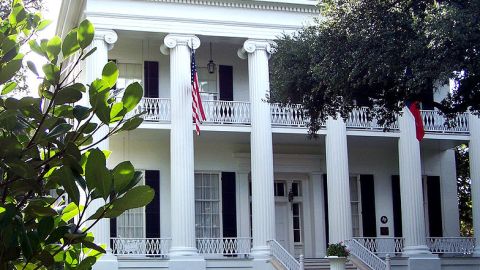Debating the Purpose of the Governor’s Mansion

It used to be one of the fundamental perks of the job, not unlike the palatial White House for any incoming president. But the governor’s mansion, long a gilded symbol of the honor of public service, is slowly becoming about as beneficial to the governor’s office as a secret FBI investigation. In many states, if the governor’s mansion hasn’t been vacated, it’s become a symbol for political inefficiencies. All on the taxpayer’s dime.
Last year, Austin, Texas saw the historic governor’s mansion become the victim of a violent blaze that caused severe structural and architectural damage. Believed to have been set by arsonists, the fire will require millions of dollars in repairs. Newsworthy as the blaze was, the mansion itself was actually empty at the time, its contents kept in storage. While they’re often revered as historic landmarks across the country, empty governor’s mansions are becoming increasingly common, making it difficult to justify their cost to taxpayers—especially when so many states are currently broke.
The trend of the emptying governor’s mansion has been percolating for some time. Cecil Andrus became a trailblazer of sorts when the newly-elected Idaho governor decided not to live in the mansion in 1987. In 1978, then-California governor Edmund Brown Jr. began loaning out the empty governor’s mansion, which cost $1.2 million to build just three years earlier. When current California Governor Arnold Schwarzenegger was first elected, he spent his time in Sacramento living in the Hyatt Hotel.
Today, governors are abstaining from living in their rightful mansion for a number of reasons. In Idaho, Governor Butch Otter has refused to live in the mansion because it once belonged to his ex-father-in-law, the late billionaire J. R. Simplot. The governor’s mansion has been left empty in a number of states, most notably Indiana, while the historic buildings have been used more recently as museums. Meanwhile, other governor’s mansions have become troubling symbols.
Even before Illinois Governor Rod Blagojevich disgraced his office, his governor’s mansion had shut off its heating and air conditioning, while its elevator apparently shut down constantly. More recently, a local man was murdered near the governor’s mansion in Albany while New York Governor David Paterson handed out Halloween candy. In South Carolina, the governor’s mansion has become a target of ridicule since the state’s First Lady, Jenny Sanford, left her husband after his embarrassing infidelities and abuses of power. Even the historic Gracie Mansion in New York City has rested empty for a decade. All this at the taxpayer’s expense. So how much revenue can be generated by selling off the governor’s mansion? Hey, the cure for every state’s budget deficit has to start somewhere.
5XQDC97Y496N





